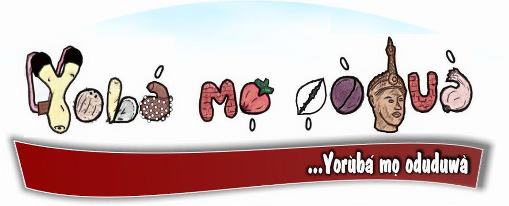Ọmọge ìwòyí o!!!
Ẹn ẹ̀yin ni mò ń báwí, ẹ t’ẹ́tí kí ẹ gb’ọ́rọ̀ ẹnuù mi
Ẹn ẹ̀yin ni mò ń báwí, ẹ t’ẹ́tí kí ẹ gb’ọ́rọ̀ ẹnuù mi
Ẹ yáa gbọ́ mi yéké.
Àntí Bùkọ́lá, Tọ́sìn o lẹ́sẹ̀ tínínrín
Sììstá Jẹ́nífà ẹlẹ́sẹ̀ pàlàbà, Fásílá o lẹ́sẹ̀ ẹdìẹe,
Àfi kí ẹ tọ́jú ki e tọ́tè, máa gbọ̀ndí kiri àdúgbò
Áwù, aṣọ kù lọ́jà, èwo ni ti bóńfò, èwo n taṣọ pénpé kí ẹ dá,
Kò balẹ̀ le fi ṣe
Àbí ẹ ò mọ̀ pé aṣọ àbúròo yín lẹ wọ̀?
Ìbàdí ọmọge yín là ń wò l’òfẹ́ lófò,
Gbogbo ọmú rè é níta, ẹ jọ̀wọ́ ẹ bòdíi yín o, ó ti súu wá í wò.
Níbi tí bùbá àti ìró tó gbáfẹ́ gbé wà,
Àmọ́ àkísà lẹ̀yín yàn láàyò.
Gbogbo ibi la ti ń bá ọ, bíi ẹ̀fúùfùlẹ̀lẹ̀
Ìwọ lónìí, ìwọ lánàá bí ẹkún apọkọjẹ
Wàá gbé dúdú, gbé pupa,
Bo ṣe ń gbé kúkúrú lò ń gbé gíga
Àti ọ̀dọ́ àt’ọkọ ilé, déédé ni
Ṣé kò kí ń rẹ̀ ọ́ ni? Ó rẹ̀ mí tì, é le è rẹ̀ mí lo fi ń ṣe
Àtolátọ̀sí, àtoní wárápá, gbogbo wọn ló ń ṣebẹ̀,
O ò kọ̀ kan, gbogbo ayé ní í gbé e sẹ́nu, kò yàtọ̀ sí síbí ilé ìjẹun
Àlàpà tó dẹnu ílẹ̀, ẹran oríṣi ní í fi bẹ̀ ṣe ‘lé
Tára bá bájẹ́ talára ní í dà, bí ọ̀rọ̀ àgbà
Ṣọ́ ọ ṣe ọmọge fácitì, ìwọ ọmọ ilé ìwé gíga ẹ ṣọ́ra ṣe
Alágẹmọ ti bímọ, àìmọ́jó dọwọ́ọ yín
The above ewì (a Yorùbá poem) talks about the indecent dressing among-st girls of now a days - ìwọ̀ kuwọ̀ láàrín àwọn ọmọge ìwòyí.
We look at western culture, imitate them and forget our own - àṣà òkèèrè là ń kọ́ ṣe, tí a gbàgbée tiwa.
We wear clothes worn by club strippers on the street - aṣọ ilé ijó là ń wọ̀ kiri ìgboro.
We no longer wear our Yorùbá attires (a ò wọ aṣọ ìbílẹ̀ẹ wa mọ́). Prostitution and promiscuity is the other of the day - àgbèrè àti panṣágà ti gbàlú kan.
See the translation of the ewì below :
Ọmọge ìwòyí o!!!
Pretty girls of now a days!!!
Ẹn ẹ̀yin ni mò ń báwí, ẹ t’ẹ́tí kí ẹ gb’ọ́rọ̀ ẹnuù mi
Yes it is you am talking to, listen to my voice
Ẹ yáa gbọ́ mi yéké.
Better listen to me clearly.
Àntí Bùkọ́lá, Tọ́sìn o lẹ́sẹ̀ tíírín
Aunty Bùkọ́lá, Tọ́sìn the tiny leg
Sììstá Jẹ́nífà ẹlẹ́sẹ̀ pàlàbà, Fásílá o lẹ́sẹ̀ ẹdìẹe,
Sister Jenifa the big leg, Fasilat the hen leg,
Àfi kí ẹ tọ́jú ki e tọ́tè, máa gbọ̀ndí kiri àdúgbò
All you know is to paint your eye and lips, shake ass about
Áwù, aṣọ kù lọ́jà, èwo n bóńfò, èwo laṣọ pénpé kí ẹ dá,
When there are clothes in the market, which one is this short, small cloth that you wear,
Kò balẹ̀ lẹ fi ṣe
Not long enough
Àbí ẹ ò mọ̀ pé aṣọ àbúròo yín lẹ wọ̀?
Or you don not know is your sister's?
Ìbàdí ọmọge yín là ń wò l’òfẹ́ lófò,
We see the waist of a beauty free of charge,
Gbogbo ọmú rè é níta, ẹ bòdíi yín o, ó ti súu wá í wò.
The breasts are out, cover it, we are tired of looking.
Níbi tí bùbá àti ìró tó gbáfẹ́ gbé wà,
When we have nice bùbá and ìró,
Àmọ́ àkísà lẹ̀yín yàn láàyò.
But you chose to wear rags.
Gbogbo ibi la ti ń bá ọ, bíi ẹ̀fúùfùlẹ̀lẹ̀
You are everywhere just like the air
Ìwọ lónìí, ìwọ lánàá bí ẹkún apọkọjẹ
It is you today, you tomorrow
Wàá gbé dúdú, gbé pupa,
You date dark and fair skinned,
Bó ṣe ń gbé kúkúrú lò ń gbé gíga
As you date short men, so you date tall ones
Àti ọ̀dọ́ àt’ọkọ ilé, déédé ni
Boys and married men, its okay
Ṣé kò kí ń rẹ̀ ọ́ ni? Ó rẹ̀ mí tì, é le è rẹ̀ mí lo fi ń ṣe
Don't you get tired? Never, you never get tired
Àtolátọ̀sí, àtoní wárápá, gbogbo wọn ló ń ṣebẹ̀,
Even patients of urinary infection, and epilepsy come close,
O ò kọ̀ kan, gbogbo ayé ní í gbé e sẹ́nu,
You don't mind, the world puts its mouth,
Kò yàtọ̀ sí síbí ilé ìjẹun
Not different from spoon of a restaurant
Àlàpà tó dẹnu ílẹ̀, ẹran oríṣi ní í fi bẹ̀ ṣe ‘lé
Broken wall that is open, any animal lives in it
Tára bá bájẹ́ talára ní í dà, bí ọ̀rọ̀ àgbà,
When the body get spoil, only the owner feels it
Ṣọ́ ọ ṣe ọmọge fácitì, ìwọ ọmọ ilé ìwé gíga ẹ ṣọ́ra ṣe
Be careful, pretty university girl, you high school girl
Alágẹmọ ti bímọ, àìmọ́jó dọwọ́ọ yín .
The masquerade agẹmọ has given birth to a child, it is left for the child to learn to dance.
What do you think about the ewì?
And don't forget to subscribe to this blog ;).
Visit YOUTUBE for the audio version.
What do you think about the ewì?
And don't forget to subscribe to this blog ;).
Visit YOUTUBE for the audio version.
Check out www.yobamoodua.org for more on Yorùbá education and information.







